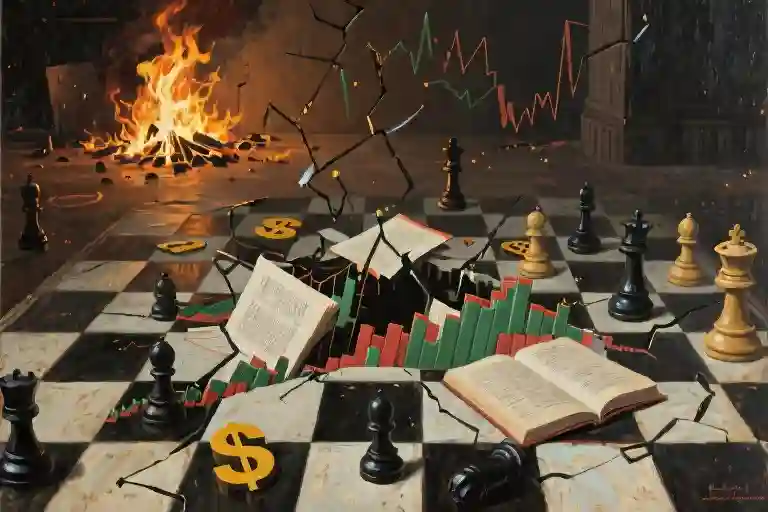There’s something peculiar about postmodern philosophers. Many of them spent considerable energy distancing themselves from Marxism, dismissing it as just another grand narrative in need of deconstruction. Yet spend an afternoon reading Laclau or Mouffe, and you’ll find page after page of sharp critiques aimed squarely at capitalism’s foundations. This creates an interesting tension – thinkers who reject Marxist theory while maintaining what feels suspiciously like a Marxist sensibility in their analysis of power structures.
Chantal Mouffe once put it bluntly: “We are not Marxists, but capitalism must be challenged.” Statements like this capture the paradoxical relationship between postmodern thought and Marxist tradition. On one hand, there’s genuine theoretical opposition – postmodernism’s suspicion of totalizing systems clashes fundamentally with Marxism’s comprehensive worldview. The very idea of historical materialism as an explanatory framework becomes problematic when you question whether such overarching explanations can exist at all.
Yet something persists. The critical impulse that drove Marx’s examination of alienation and exploitation didn’t disappear in postmodern writing – it simply transformed. Where Marx saw class struggle as the engine of history, postmodern thinkers might analyze how power circulates through discourse or how identities are constructed within capitalist systems. The targets remain similar, even when the methods and theoretical underpinnings change dramatically.
This isn’t to suggest some secret Marxist conspiracy among postmodern theorists. The relationship is more subtle – more about shared temperament than shared doctrine. There’s a common restlessness with the status quo, a similar willingness to question what others accept as natural or inevitable. Both traditions share what we might call a hermeneutics of suspicion when examining social arrangements.
What makes this particularly fascinating is how consciously many postmodern philosophers developed their ideas in dialogue with – and often in opposition to – Marxist thought. The rejection wasn’t casual or accidental; it represented serious philosophical engagement. This very intensity of disagreement suggests how central Marxist theory remained as a reference point, even for those moving beyond it.
We’re left with a curious inheritance. Postmodern political thought, for all its differences from classical Marxism, continues what might be called the Marxist project – the relentless critique of existing social orders – while abandoning most of Marxism’s theoretical apparatus. The baby of critical analysis gets kept, while the bathwater of deterministic historical narratives gets thrown out. This creates space for new forms of social critique that borrow Marxism’s disruptive energy while rejecting its systematic ambitions.
Deconstructing Grand Narratives: Postmodernism’s Rejection of Marxism
The postmodern turn in philosophy brought with it a deep skepticism toward any system claiming to explain human history through a single, unified framework. Jean-François Lyotard famously defined postmodernism as ‘incredulity toward metanarratives’—those sweeping stories societies tell about progress, liberation, or inevitable historical development. Marxism, with its dialectical materialism and teleological view of class struggle, became a prime target of this critique.
Thinkers like Michel Foucault challenged Marxism’s ‘totalizing’ impulse—the way it reduced complex social relations to simplistic economic determinism. In his archaeological method, Foucault showed how power operates through dispersed institutions and discourses rather than just through class domination. Jacques Derrida’s deconstruction similarly revealed the instability of Marxist concepts when subjected to linguistic scrutiny.
This rejection wasn’t about dismissing Marx’s insights entirely. It stemmed from recognizing that Marxism had become its own kind of institutionalized orthodoxy—what some philosophers half-jokingly called ‘an outdated operating system.’ The Soviet experiment demonstrated how revolutionary theories could harden into dogmatic state ideologies. Postmodernists worried that Marxism’s promise of emancipation through proletarian revolution had become another exclusionary narrative, silencing alternative forms of resistance.
Yet this critique contained an ironic twist. While dismantling Marxism’s theoretical architecture, many postmodern philosophers preserved its critical spirit. They kept Marx’s razor-sharp tools for analyzing power and alienation, even as they discarded his blueprint for social transformation. The next chapter will explore how this paradoxical relationship played out in concrete critiques of capitalism—where postmodern thinkers often found themselves fighting familiar battles on unfamiliar terrain.
The Persistent Critique: Postmodernism’s Challenge to Capitalism
The rejection of Marxism by postmodern thinkers never translated into an embrace of capitalism. If anything, the opposite occurred – capitalism became the primary target of their intellectual scrutiny. This creates a fascinating paradox: philosophers who dismantled Marxist theory as another oppressive “grand narrative” simultaneously sharpened their tools against the very system Marxism opposed.
Ernesto Laclau and Chantal Mouffe exemplify this tension perfectly. In Hegemony and Socialist Strategy, they explicitly distance themselves from classical Marxism while constructing what amounts to a sophisticated anti-capitalist framework. Their concept of “radical democracy” functions as both a rejection of Marxist determinism and a challenge to capitalist hegemony. The book reads like someone using Marx’s magnifying glass to examine capitalism while having burned Marx’s instruction manual.
Three distinctive postmodern approaches emerged in critiquing capitalism:
- Discourse analysis – treating economic systems as linguistic constructions rather than natural laws
- Identity politics – shifting focus from class struggle to intersecting oppressions
- Micro-power examination – investigating capitalism’s capillary effects in daily life
Compare this to traditional Marxist critique:
| Aspect | Marxist Approach | Postmodern Approach |
|---|---|---|
| Primary focus | Means of production | Language and representation |
| Change mechanism | Revolution | Discourse subversion |
| Central actor | Proletariat | Multiple subject positions |
| Temporal orientation | Historical materialism | Present-focused critique |
What makes this postmodern critique particularly effective is its refusal to play by capitalism’s rules. When Marxists debate capitalists about fair wages, they accept the basic framework of wage labor. Postmodernists question why we’re having that conversation at all – they challenge the vocabulary itself. It’s like watching someone dismantle a chessboard while others argue about better moves.
The lingering Marxist spirit appears in their shared impulse to expose capitalism’s contradictions. Where Marx revealed how capitalism alienates workers from their labor, postmodernists show how it alienates meaning from language, identity from selfhood. The tools changed, but the diagnostic impulse remained.
This creates an odd situation where business schools teach Marxist-derived critical theory (to analyze organizational power) while dismissing postmodernism as frivolous – unaware they’re branches from the same critical tree. The postmodern critique may have discarded Marx’s solutions, but it kept his habit of asking uncomfortable questions capitalism would rather not answer.
The Invisible Legacy: Marxist Spirit in Postmodern Thought
The relationship between postmodernism and Marxism often feels like watching two siblings who insist they have nothing in common, yet keep finishing each other’s sentences. While postmodern philosophers famously rejected Marxism as another grand narrative to be deconstructed, something curious happens when you examine their actual writings. The ghost of Marx seems to hover just beyond the footnotes, whispering critiques of capitalism that sound strangely familiar.
At the heart of this paradox lie three fundamental elements of Marxist thought that quietly migrated into postmodern theory: dialectical thinking, theories of alienation, and the relentless pursuit of emancipation. Take dialectics – that Marxist method of seeing contradictions as engines of change. Postmodernists may have abandoned the specific historical dialectic of class struggle, but they preserved the core practice of exposing contradictions within systems. When Foucault analyzes how power both represses and produces, or when Derrida reveals how texts undermine their own meanings, they’re doing something remarkably dialectical.
The concept of alienation underwent perhaps the most fascinating transformation. Marx’s worker alienated from labor became, in postmodern hands, the subject alienated from language, from identity, from the very categories used to understand experience. That persistent Marxist concern with how systems distort human potential simply changed address, moving from the factory floor to the discursive realm. You can almost trace a direct line from Marx’s economic alienation to Lacan’s symbolic alienation.
Then there’s that stubborn Marxist commitment to emancipation. Postmodernists might reject the notion of a unified revolutionary subject, but they never stopped trying to expose what binds us. Derrida’s later work, particularly Specters of Marx, makes this explicit – his hauntology isn’t just wordplay but a serious engagement with Marx’s emancipatory impulse. The targets changed (discourse rather than capital), but the underlying desire to free human beings from invisible constraints remained.
This hidden continuity becomes clearest in the debates between thinkers like Jameson and Rorty. Jameson insists postmodernism simply is the cultural logic of late capitalism, while Rorty sees it as a clean break. But both positions acknowledge some relationship – the question is whether it’s one of complicity or critique. The truth likely lies in recognizing that postmodernism inherited Marx’s critical tools while distrusting his blueprints for change.
What emerges isn’t a repudiation but a recalibration of Marxist thought – keeping the diagnostic sharpness while dispensing with what seemed like prescriptive naivete. The postmodern critique of capitalism may lack Marx’s systematic rigor, but it gained something equally valuable: an ability to track power’s liquid movements through culture, identity, and language. In this sense, postmodernism didn’t abandon Marxism so much as equip it for new battles.
The Echoes in Practice: Postmodern Critique in Contemporary Movements
The theoretical battles between postmodernism and Marxism might seem confined to academic journals and philosophy seminars, but their ripples reach far beyond university walls. When the Occupy Wall Street protesters chanted “We are the 99%,” they weren’t quoting Laclau or Mouffe directly, yet their discourse bore the unmistakable fingerprints of postmodern political thought.
Decoding the 99%: Occupy’s Postmodern Moment
That simple numerical slogan achieved something remarkable – it constructed a new political subject through language itself. Unlike traditional Marxist appeals to the proletariat, this wasn’t about economic position in the means of production. The 99% created what postmodern theorists call a ‘floating signifier’ – an identity category flexible enough to include students drowning in debt, precarious gig workers, and even small business owners squeezed by monopolies. The genius lay in its discursive construction of solidarity, proving how postmodern emphasis on language games could mobilize real bodies in physical spaces.
I remember watching the occupation unfold and realizing how differently these protesters framed their grievances compared to the labor marches of previous generations. No one was singing Solidarity Forever or waving red flags. Instead, the General Assemblies operated through consensus-based direct democracy that would make any postmodern theorist nod in recognition – decentralized, suspicious of fixed leadership, embracing multiple narratives rather than one unified party line.
Green Politics and the Postmodern Turn
The environmental movement’s evolution shows even clearer postmodern tendencies. Where traditional leftist organizing might structure a campaign around class analysis of polluting industries, groups like Extinction Rebellion consciously avoid hierarchical structures. Their ‘holacracy’ model distributes authority across autonomous affinity groups – a living embodiment of postmodernism’s suspicion of grand narratives and centralized power.
During a climate march last year, I noticed how protesters carried signs referencing indigenous knowledge alongside scientific data, queer ecology next to workers’ rights demands. This kaleidoscopic approach rejects the modernist notion that we must choose one master framework (be it class struggle or technological solutionism) to address ecological crisis. The movement speaks in what Mouffe might call a ‘chain of equivalences,’ linking diverse struggles without subsuming them under one privileged category.
The Limits of Postmodern Resistance
Yet for all its theoretical sophistication, the postmodern influence creates tangible challenges. After attending several activist meetings where debates about inclusive language consumed more energy than concrete plans, I began understanding critics who accuse postmodern politics of becoming paralyzed by its own reflexivity. When every action must first deconstruct its own potential exclusions, the sense of urgency can dissipate.
The absence of clear revolutionary subjects – that famous postmodern ‘death of the meta-subject’ – leaves movements struggling to articulate who exactly will enact change. Unlike Marxism’s confident proletariat, postmodern activism often seems caught between celebrating fragmented identities and needing collective agency. During a particularly frustrating strategy session, an older organizer muttered what many were thinking: “You can’t tweet capitalism into oblivion.”
Between Theory and Pavement
What emerges from these movements isn’t some pure application of postmodern theory, but rather a messy, improvisational dialogue between ideas and action. The activists I’ve interviewed rarely cite philosophical texts, yet their practices reveal an intuitive grasp of postmodern concepts – from performative civil disobedience that ‘queers’ public space to meme warfare that destabilizes official narratives.
Perhaps this is where postmodernism’s Marxist inheritance becomes most visible: in the unbroken commitment to imagining alternatives, even as the old certainties collapse. The occupiers and climate activists may have abandoned Marx’s specific blueprint, but they’ve kept alive what matters most – the refusal to accept that capitalism represents the end of history. Their experiments in radical democracy, however imperfect, continue the project of reinventing emancipation for our fragmented age.
The Critical Heir: Postmodernism’s Unfinished Dialogue with Marxism
The relationship between postmodernism and Marxism defies simple categorization. While postmodern philosophers explicitly rejected Marxism as another grand narrative to be deconstructed, their work pulsates with a familiar rhythm—the relentless critique of capitalism. This paradox suggests something more nuanced than outright rejection: a selective inheritance where the spirit of Marxist critique survives its theoretical framework.
A Legacy in Fragments
Postmodernism didn’t discard Marxism so much as dissect it. Think of it like renovating an old house—keeping the sturdy foundation of social critique while tearing down what Lyotard called “the dubious architecture of historical determinism.” The tools changed (discourse analysis replacing dialectical materialism, micro-politics supplanting class struggle), but the target remained. When Laclau and Mouffe developed their theory of radical democracy, they weren’t writing love letters to free markets—they were designing new weapons from salvaged Marxist parts.
This explains why every major postmodern thinker, from Foucault to Derrida, reserved their sharpest blades for capitalism. Foucault’s biopolitics exposed the market’s disciplinary mechanisms; Baudrillard’s simulacra revealed consumer culture’s hollow core. Their critiques lacked Marx’s teleological confidence, but shared his fundamental impulse: to expose the violence hidden beneath liberal modernity’s polished surface.
The Ghost in the Machine
What exactly survived this theoretical transplant? Three Marxist instincts migrated into postmodern thought:
- The hermeneutics of suspicion—that habit of looking for power where others see nature or consensus
- The commitment to unmasking—revealing how social arrangements benefit specific groups
- The emancipatory drive—however fragmented or reconfigured
Derrida acknowledged this spectral presence in Specters of Marx, where he described deconstruction as “a radicalized Marxism.” The vocabulary changed (“discourse” instead of “ideology,” “subject positions” rather than “class consciousness”), but the diagnostic impulse persisted. Even postmodernism’s famous rejection of totality borrowed from Marx’s own critique of Hegel—applying dialectical skepticism to dialectics itself.
Living with the Tension
This incomplete break creates productive tensions for contemporary praxis. The Zapatista movement’s “preguntando caminamos” (walking while asking) ethos—with its rejection of vanguard parties yet insistence on collective liberation—demonstrates postmodern Marxism in action. Similarly, climate justice activists employ postmodern critiques of progress narratives while organizing transnationally against capitalist extraction.
The challenge lies in avoiding two traps: nostalgic returns to orthodox Marxism, or postmodern relativism that paralyzes action. Perhaps the way forward involves embracing what Mouffe called “the paradox of democracy”—fighting for universal emancipation while acknowledging the contingent nature of all political projects.
Carrying the Torch
For readers seeking to engage this legacy, start by asking:
- How can postmodern sensitivity to difference strengthen rather than weaken collective action?
- What forms of organization might balance fluidity with efficacy?
- Where do today’s hidden abodes of capital require fresh modes of critique?
The unfinished conversation between Marxism and postmodernism remains our most potent resource for understanding—and challenging—the present. Their uneasy partnership reminds us that critique evolves not through purity, but through creative contamination.






I have to show appreciation to this writer just for rescuing me from such a predicament. Right after searching throughout the online world and meeting notions that were not helpful, I believed my life was gone. Living minus the answers to the difficulties you have fixed through your main write-up is a crucial case, as well as ones that might have adversely affected my entire career if I hadn’t encountered your web blog. Your own competence and kindness in playing with everything was excellent. I am not sure what I would’ve done if I had not come across such a point like this. I can also at this moment look forward to my future. Thanks for your time so much for your high quality and sensible help. I will not hesitate to propose your site to any individual who needs tips on this area.